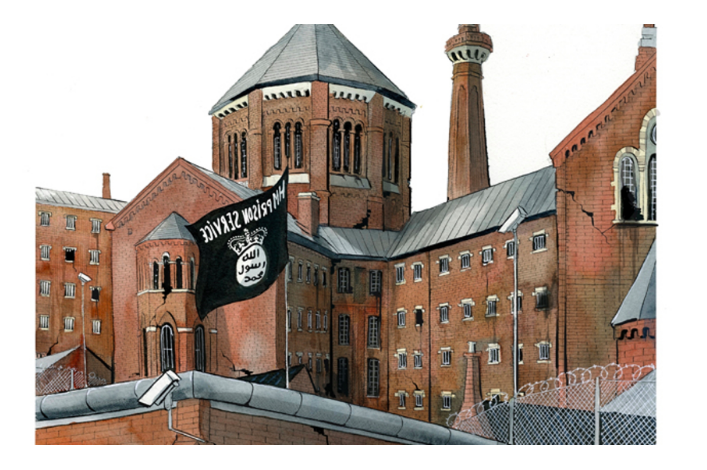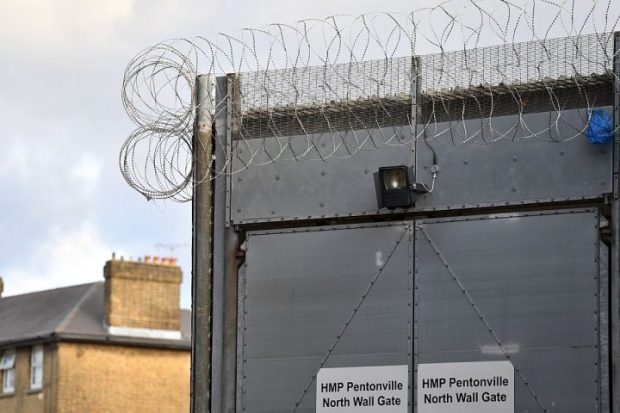Was Reading terrorist Khairi Saadallah radicalised behind bars? What we do know is that locking Saadallah in HMP Bullingdon to develop a ‘close’ relationship with radical cleric Omar Brooks was an extraordinary lapse in operational security. Only 16 days after leaving the prison, the violent, troubled and combat experienced Saadallah launched his murderous attack in Reading. At the very least, it is clear that prison served little purpose in stopping him.
Once again, this raises the question of whether Britain’s jails are a breeding ground for radicalisation. When one of this country’s most notorious apologists for terrorism Anjem Choudary was locked up five years ago, there was much speculation as to how he could be prevented from dripping poison into the ears of those locked up alongside him. It is likely that Choudary was confined for at least some of his sentence in a separation unit, a repurposed wing of a High Security prison designed to incapacitate offenders who pose a threat to national security.
I conceived of these units in a report I compiled in 2016 on the extremist threat. My idea was unpopular with senior managers in the Prison Service (which came as little surprise) but the Government listened to me and introduced them anyway. At one time, three of these units were in operation. Intelligence from inside prison was used to isolate charismatic and dangerous prisoners who were determined to subvert national security and convert others to violent extremism.
But while the terror threat Britain faces has not gone away, it seems that these units’ days might be numbered. As late as 2019, the Ministry of Justice’s own research paper showed three separation centres working effectively. A full curriculum was being delivered, and the units were safe, decent and secure environments with highly motivated staff. Now more recent reports suggest just one remains in operation, with reportedly only eight prisoners held in it. In that unit, at HMP Frankland in Country Durham, the local independent watchdog has raised concerns about the ‘mothballing’ of other units and the impact this has had. (I’ve never been invited back to see these units, so I’ve no way of knowing for sure why this sudden collapse in effectiveness has occurred.) It has been reported that the closure of these units means 97 per cent of convicted extremists are able to mix with vulnerable inmates in our prisons.
Britain’s prisons, perhaps as never before, are well evidenced incubators and accelerators of violent extremism. They are places where it is ludicrously easy for hate preachers to target, get alongside and manipulate weak people searching for meaning and purpose, or for those already mobilised to hone their skills. The Islamist extremists Usman Khan and Sudesh Amman, as well as Khairi Saadallah, are grim testimony to the scale of the problem.
The recent conviction of two terrorists who tried to murder an officer inside HMP Whitemoor was particularly chilling. It demonstrated that it was possible, even in one of the most supposedly secure places in the UK, for an Islamist extremist to groom a violent prisoner to join him in a terror attack. Only good luck and extraordinary bravery saved the life of the prison officer the pair targeted.
Yet we are risk of allowing something like this to happen again. If it is right that only one separation unit now remains – and that as few as eight prisoners are held there – what about the other extremists behind bars today? Who are they sharing their cells with? Who are they mixing with and influencing? Are these high-risk prisoners being monitored?
The separation of Islamist proselytisers in prison is the worst solution apart from all the alternatives. Staffing and running separation units is a hugely complex and challenging job. No one is saying otherwise. But surely it is worthwhile? From Vienna to Brussels, we see Islamists networking in prisons, deceiving well-meaning but naïve attempts by officials to change them. Tragic results are the inevitable consequence.
The growing number of extreme right terrorists won’t be far behind either. These people notice weakness and they will fill any space abandoned by the state. How we deal with terrorists behind bars is a task that is hopelessly compromised by a lack of bravery, not among the frontline staff who work in our prisons, but in those a world away in senior managerial roles.
Across the world, even prison systems regarded as more liberal than ours are taking steps to shut down these vectors of radicalisation and isolate the groomers. If our own prison service cannot or will not accept this challenge, it must be stripped of that responsibility. The only thing we can be sure of right now is that within those walls, tomorrow’s jihadist is in the making.
Got something to add? Join the discussion and comment below.
Get 10 issues for just $10
Subscribe to The Spectator Australia today for the next 10 magazine issues, plus full online access, for just $10.




















Comments
Don't miss out
Join the conversation with other Spectator Australia readers. Subscribe to leave a comment.
SUBSCRIBEAlready a subscriber? Log in